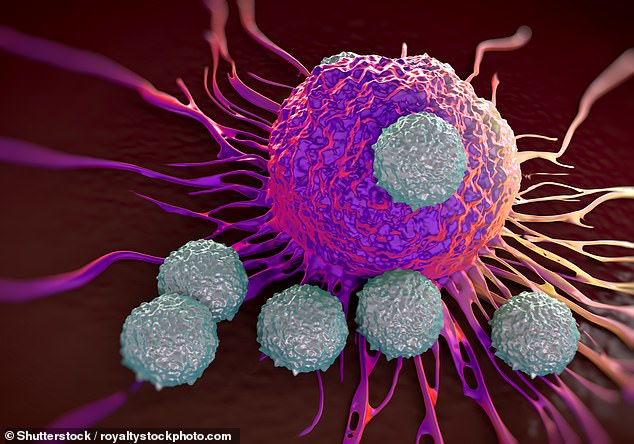Why Retiring Means Our Immunity Also Becomes Much Weaker
Scientists have discovered why an important organ retires at the same time we do: the production of cells essential for good health stops.
The thymus produces T cells, which help the body fight infection and disease. But it pretty much stops working around age 65, meaning our immune systems become much weaker.
As we age, the thymus gland, located behind the breastbone, shrinks and the T-cell producing areas are replaced by fatty tissue, while ‘scarring’ prevents regeneration.
Cancer treatments also damage the thymus, making recovery from infection much slower in young people with the disease.
Scientists have discovered that the thymus, an organ located behind the breastbone, retires at the same time as we do, stopping the production of cells vital to good health.

The thymus produces T cells (shown in one illustration fighting a cancer cell), which help the body fight infection and disease.
The team behind the groundbreaking research say their findings could be important for the development of immune-boosting therapies for people aged 60 and over and for people undergoing cancer treatment.
Co-author Dr Kelin Zhao from the WEHI Research Institute in Melbourne, Australia, said: ‘This knowledge allows us to investigate whether these cells could be therapeutically targeted in the future to turn back the clock on the ageing thymus and boost T cell function in humans as we age. This is the goal our team is working towards.’
Professor Daniel Gray, head of the laboratory at WEHI, said: ‘Adults with weakened immune systems… take years for their T cells to recover – or sometimes not at all – leaving them at greater risk of contracting potentially life-threatening infections for the rest of their lives.
‘Discovering ways to restore thymus function is critical so that we can find new therapies that can improve outcomes for these vulnerable patients, and a way to ensure that we produce healthy levels of T cells throughout our lives.’
Dr Gray added: ‘Our discovery provides a new angle for thymus regeneration and immune system repair, and may provide a way to improve immune function in vulnerable patients in the future.’
